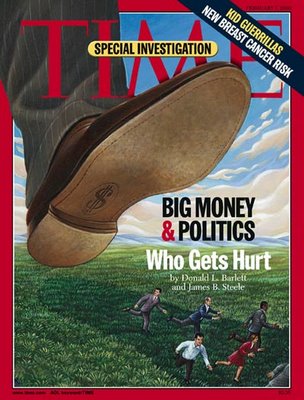ANTI-LABOR DEMOCRATIC SENATORS WILLING TO WORK FOR CAMPAIGN CONTRIBUTIONS... FROM BIG BUSINESS
>

The National Association of Wholesaler-Distributors is a lobbying organization/front group for the business end of the Republican coalition. They're not concerned with health care costs going through the roof and endangering the solvency of their members; they're concerned with an overall reactionary Republican agenda. And speaking of reactionary NAW's chairman, Robert Reynolds, released a statement today attempting to rewrite the history of GOP losses in November.
"Now that the dust is settling on the midterm elections, the great sport of Monday morning quarterbacking is in full force, with pollsters, pundits, and politicians all trying to come up with the most insightful analysis of what motivated voters to reject Republicans and return both Houses of Congress to Democrat control. The big three issue winners are, of course, the war in Iraq, Congressional corruption scandals, and an economy that simply left a lot of American wage earners behind. The truth, in all likelihood, is that all three issues contributed to the perfect storm that ended the Republicans' 12-year run as the Congressional majority."
Doesn't sound very controversial or like the whacky stuff we we've come to expect from the greed and selfishness partisans of the far right. Be patient; he's getting to that.
While benefiting from a nationalized election in which the critical issues all cut against the governing Republican majority, the Democrat minority in the last Congress was able to create legislative gridlock and prevent the Republicans from chalking up very many legislative accomplishments.
In short, the Republicans clearly lost the last election, but it is not so clear that the Democrats won it on their merits.
While the blame game and hindsight may make for interesting conversation, the more important question now is "What lies ahead?" The campaign is over, and the new Democrat Congressional majority can no longer win simply by preventing legislation from passing and capitalizing on Republican missteps. The Democrats are now responsible for moving the legislative train and producing results. So what does that mean for issues important to wholesaler-distributors? To a large extent, the results may not be very different; but the process certainly will be. In the last Congress, business interests were "on offense"-– attempting to overcome strong minority opposition in order to pass pro-business legislation. As a result of that opposition, not much got done, and only legislative items that could garner bipartisan support made their way to the President's desk for his signature. In the next Congress, we are certain to be "on defense," working with a strong minority to block or modify bad legislation and ensure that, again, only those items that can win bipartisan support prevail.
The biggest issue ahead is tax policy, and we will certainly be on defense in that arena. While the Democrats are now saying they won't attempt to repeal the Bush tax cuts, they have a long track record of opposition to those tax policies and have previously attempted to repeal or roll them back. Moreover, they list as one of their top priorities repeal or reform of the Alternative Minimum Tax (AMT) for individuals. However, the revenue loss to the government from AMT repeal would be huge-– estimated at about $1.3 TRILLION dollars over 10 years – and they would have to make up that revenue loss somewhere. LIFO repeal remains a very real threat to us, and we'll be hearing a lot of discussion about closing the "tax gap" and corporate tax overhaul. The devil will be in the details on these tax proposals, and we will need to watch for tax increases disguised as good government reform. Also on the tax front, it is pretty clear that permanent repeal of the death tax will not prevail next year.
Our defensive effort will also have to be energized on labor issues. Organized Labor's agenda has been stymied for the last dozen years, and they are prepared to make a strong push for enactment of their high priority issues as soon as the Congress convenes in January. A recent article in Roll Call, the Capitol Hill newspaper, reported that both Labor federations "have taken steps to communicate to Democrat leaders that their political mobilization was a key reason the party is now back in power-- and that labor's investment comes with the expectation of a return."
Labor's top priority is the so-called "card check" legislation by which unions would be empowered to intimidate workers and organize workplaces more easily by denying workers a secret ballot vote on whether or not to accept union representation. While their legislation would deny workers the right to a secret ballot vote against the unions, it would also toughen penalties against employers for so-called "unfair labor practices." They also have universal health care, pension protection, and toughening of corporate bankruptcy laws on their wish list. With the House and Senate labor committees being chaired by George Miller (D-CA) and Ted Kennedy (D-MA) respectively, Labor has tough and aggressive champions in both Houses of Congress.
Another area where business vigilance will be necessary is health care. Democrat leaders have already laid claim to this as one of their top priorities, and we can expect to see battles over renewed efforts to pass "Patients' Bill of Rights" and "single payer" legislation. Fortunately, the Administration is moving forward with implementation of the President's innovative private sector-focused Executive Order to address the rising cost of health care, and there are strong advocates in Congress for ensuring that private sector solutions remain a part of any legislative health care reform legislation.
In the area of tort reform, it is highly unlikely that the trial lawyers who form another large part of the winning Democrat base will allow anything meaningful to be enacted. However, tort reform advocates among the Congressional minority can be expected to offer amendments to force Members to go on record on the issues, thus setting the stage for the 2008 Congressional elections. On the positive side, there are signs that a bipartisan approach to energy legislation is possible, with moderate Democrats willing to approve at least limited domestic oil exploration in a package with increased support for alternative energy sources.
The new Democrat majority in Congress is promising an increase in bipartisan cooperation in the next Congress, while at the same time promising to push the Democrats legislative agenda that has been bottled up during the 12 years of GOP control. And the newly humbled Republican minority is responding in kind to the need for more bipartisanship, while at the same time promising to return to the basic principles of limited government, fiscal restraint, and low taxes that won Republicans the majority a dozen years ago.
While the phrase has become something of a cliché, it is nonetheless true that "eternal vigilance is the price of liberty." Our job as part of the American business community is clear. We need to stay in tune, stay involved, and stay active in the political process. If we do, we can help prevent the enactment of an anti-business, pro-organized Labor agenda. If we tune out, we cannot expect our interests to be protected and advanced in the 110th Congress.

You might want to just dismiss this as a bunch of silly tripe from a Republican lackey, one of their Gang of 6 business front organizations. It sure smells like silly tripe. But it's important to remember that the NAW has some friends on the other side of the aisle too-- some very important ones. There are seven borderline Democrats who tend to vote as frequently as they can for NAW initiatives proffered by the Republicans-- Ben Nelson (NE), Max Baucus (MT), Mary Landrieu (LA), Blanche Lincoln (AR), Tom Carper (DE), Mark Pryor (AR), and, if you want to count him as even a borderline Dem, Holy Joe Lieberman (CT). These senators, who were only too happy to define bipartisanship for the past 6 years as selling our Democratic values and principles and voting for Big Business interests over the interests of workers and consumers, are now threatening to veto any legislation that they judge to not be bipartisan. And until legalized bribes are taken out of the electoral system, this is how we can expect it to be.



0 Comments:
Post a Comment
<< Home